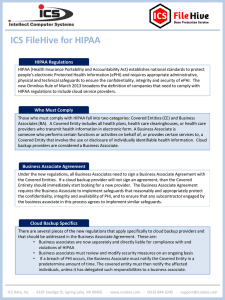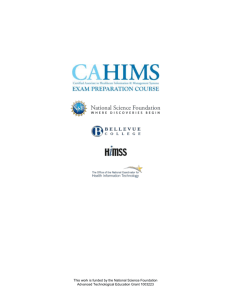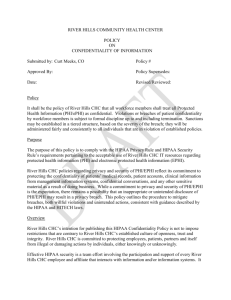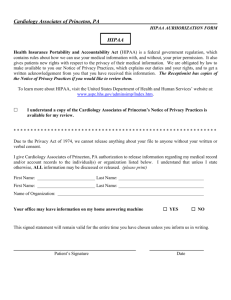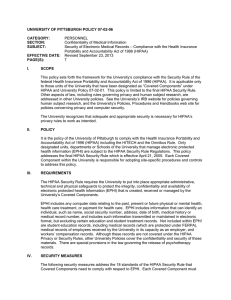InfoSec Acceptable Use Policy
advertisement
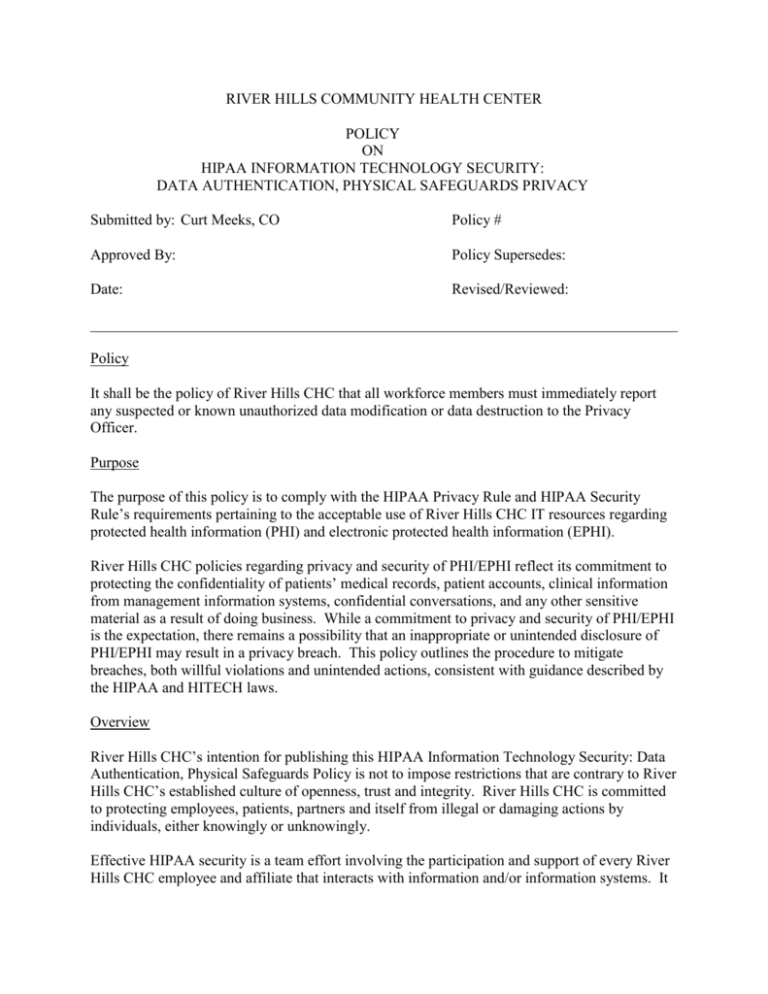
RIVER HILLS COMMUNITY HEALTH CENTER POLICY ON HIPAA INFORMATION TECHNOLOGY SECURITY: DATA AUTHENTICATION, PHYSICAL SAFEGUARDS PRIVACY Submitted by: Curt Meeks, CO Policy # Approved By: Policy Supersedes: Date: Revised/Reviewed: ______________________________________________________________________________ Policy It shall be the policy of River Hills CHC that all workforce members must immediately report any suspected or known unauthorized data modification or data destruction to the Privacy Officer. Purpose The purpose of this policy is to comply with the HIPAA Privacy Rule and HIPAA Security Rule’s requirements pertaining to the acceptable use of River Hills CHC IT resources regarding protected health information (PHI) and electronic protected health information (EPHI). River Hills CHC policies regarding privacy and security of PHI/EPHI reflect its commitment to protecting the confidentiality of patients’ medical records, patient accounts, clinical information from management information systems, confidential conversations, and any other sensitive material as a result of doing business. While a commitment to privacy and security of PHI/EPHI is the expectation, there remains a possibility that an inappropriate or unintended disclosure of PHI/EPHI may result in a privacy breach. This policy outlines the procedure to mitigate breaches, both willful violations and unintended actions, consistent with guidance described by the HIPAA and HITECH laws. Overview River Hills CHC’s intention for publishing this HIPAA Information Technology Security: Data Authentication, Physical Safeguards Policy is not to impose restrictions that are contrary to River Hills CHC’s established culture of openness, trust and integrity. River Hills CHC is committed to protecting employees, patients, partners and itself from illegal or damaging actions by individuals, either knowingly or unknowingly. Effective HIPAA security is a team effort involving the participation and support of every River Hills CHC employee and affiliate that interacts with information and/or information systems. It is the responsibility of every computer user to know these guidelines, and to conduct their activities accordingly. Any time that protected health information (PHI) is referenced in this policy, it is referencing the HIPAA Privacy Rule; when electronic protected health information (EPHI) is referenced in this policy, it is referencing the HIPAA Security Rule. Scope This policy applies organization-wide. Procedure 1. Data Authentication 1.1 EPHI shall be protected by authentication controls on all information technology (IT) resources 1.2 Authentication controls shall minimally include a unique user logon and password combination 1.3 EPHI shall be encrypted while stored on IT resources whenever available and feasible or whenever deemed necessary by the risk analysis or evaluation in accordance with the HIPAA Security Risk Management, Evaluation and Audit Policy. 1.4 EPHI shall be encrypted while in transit across an open communications network; files containing EPHI intended to be transmitted outside the River Hills CHC Intranet shall be encrypted and transmitted using approved secure messaging products. 1.5 Mail messages containing EPHI intended to be transmitted outside the River Hills CHC Intranet shall be encrypted and transmitted using approved secure messaging product(s). 1.6 All other EPHI transmissions (e.g. client/server connections) shall be encrypted using approved mechanisms (e.g. virtual private networks) whenever available and feasible, or whenever deemed necessary by the risk analysis or evaluation in accordance with HIPAA Security Risk Management, Evaluation and Audit Policy. 1.7 EPHI integrity shall be sustained using approved mechanisms (e.g. hashing algorithms, electronic signatures and digital signatures) whenever available and feasible or whenever deemed necessary by the risk analysis or evaluation in accordance with HIPAA Security Risk Management, Evaluation and Audit Policy. Page 2 of 3 2. Data Physical Safeguards 2.1 IT resources shall be secured using physical safeguards for protection from unauthorized access; e.g. door locks or locking cabinets. 2.2 Screen locks (e.g., session timeouts, auto logoff) with password controls shall be activated on all IT resources (e.g. laptops, desktops, consoles) 2.3 Portable IT resources (e.g. laptops, smart phones, personal digital assistants (PDAs)) shall be physically secured when not in use) 3. Virus protection 3.1 Virus protection shall be installed and activated on all IT resources containing EPHI. 3.2 Additional mechanisms shall be implemented to further protect IT resources from malicious software whenever deemed necessary by the risk analysis or evaluation in accordance with HIPAA Security Risk Management, Evaluation and Audit Policy. 4. Enforcement Any employee found to have violated this policy may be subject to disciplinary action, up to and including termination of employment. 5. Reference(s) 5.1 Health Insurance Portability and Accountability Act of 1996 (HIPAA) at 45 C.F.R. § 164.308; § 164.530 5.2 The American Recovery and Reinvestment Act of 2009 (ARRA) Division A, Title XIII, Part 2, Subtitle D-Privacy Sec. 13400; Sec. 13402 of the HITECH Act 5.3 HIPAA Security Risk Management, Evaluation and Audit Policy 5.4 Mobile Computing Device Policy 5.5 HIPAA Security Virus Protection Policy 5.6 Data Classification, Sensitivity, Use, and Retention Policy Page 3 of 3
